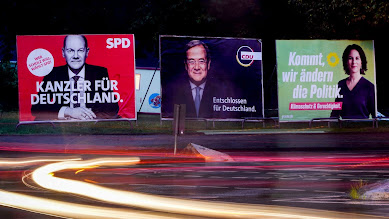Germany's leading candidates, from left to right: Olaf Scholz (SPD), Armin
Laschet (CDU), Annalena Baerbock (Green)
While the center of attention of American politics every 4 years is the Presidential election, for Germany, it’s the federal parliamentary election that is most important, since the federal president is a mostly ceremonial position. There are 299 electoral districts, with approximately 250 thousand residents each. Each elector has two votes on the ballot. The first vote is the constituency vote, which decides who will represent the district using the first-past-the-post, winner-takes-all method. These account for half of the base number of seats in the Bundestag, the other half is filled according to the party list, determined by the second vote. This is where it gets a bit more complicated. For folks who prefer a particular candidate to represent their constituency, but identify more strongly with a different party’s policies, Germany’s electoral system makes choosing both possible using the mixed-member proportional representation system. After the ballots are counted, the percentage each party gets for the second vote corresponds to the percentage of seats they have in the Bundestag, so the composition of the Bundestag resembles the actual popularity of the parties among electors. However, candidates in the first vote have party-affiliations too, how do we keep it proportional if one party happens to have a lot of district representatives? Simply, add more seats. The number 598 is the floor, not the ceiling. In fact, the 19th and current Bundestag has a total of 709 members, making it the largest one to date. These additional seats, called overhang seats, ensure the diversity of viewpoints in the Bundestag, and allow for proportional representation of the public opinion.
But how much diversity are we speaking of here? How many parties actually enter the Bundestag? Both Germany and America have multi-party systems, yet Americans have mostly never known of another major party besides the traditional opponents, red and blue. Is Germany any different?
Germany has 6 major parties.
(Source: Deutscher Bundestag)
(Source: Wahlrecht.de)
This new coalition government then votes, without debate, on a chancellor, who is appointed by the president of Germany. All of this is to suggest that once the elections are finished, there is still a lengthy period before the new administration takes form, mostly due to the coalition negotiations. Sometimes, it could take up to six months, as had happened after the 2017 election. Yet however arduous the path to mutual ground is, the German electoral system guarantees it will be found. As no singular party could come into power without being the majority, parliament members must heavily rely on the spirit of cooperation and concession to get the job done. This is also one of the defining features of German politics, as opposed to the increasingly polarized American politics. Instead of relentlessly attacking and antagonizing the opposition, German politicians seek and speak of concessions and mutual agreement with other parties, not just the other. Angela Merkel was certainly an example: despite being a member of Union, which is the center-right party of Germany, she yielded to the SPD, the center-left party, on such important issues as EU policy and labor-market matters. This created a coalition government that, despite having the conservative Union as the most populated parliament group, had the most social democratic policies in recent history. Combine this with the fact that German citizens have more viable options to vote on (the Green party is actually a mainstay of mainstream politics here, thanks to the mixed-member proportional representation system) and we can see that the example of Germany’s electoral system certainly gives Americans some food for thought.
Sources:
https://www.theguardian.com/world/2021/sep/13/german-election-poll-tracker-who-will-be-the-next-chancellor
http://math-www.uni-paderborn.de/~axel/us-d.html#toc
https://www.grin.com/document/386600
https://www.dw.com/en/german-election-process/a-37805756
https://www.project-syndicate.org/commentary/germany-grand-coalition-risks-by-helmut-k--anheier-2018-03
https://postcourier.com.pg/coalition-governments-advantages-unpopular-traits/
https://aceproject.org/ace-en/topics/bd/annex/bdy/bdy_de/mobile_browsing/onePag
https://www.bundestag.de/





No comments:
Post a Comment